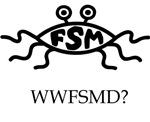|
|
Badtux the Snarky PenguinIn a time of chimpanzees, I was a penguin. Religious fundamentalists are motivated by the sneaking suspicion that someone, somewhere, is having fun -- and that this must be stopped. |
Thursday, May 24, 2007The American dietOne blogger, who shall remain nameless, put up a label of a can of soup with the sodium number circled and said "See? That's what's wrong with the American diet! Look at all this sodium, it causes heart disease and hypertension! Our forefathers who ate natural foods didn't eat like this."Uhm, no, young lady, what, exactly, do you think was used to preserve meats in the time before refrigeration? I'll give you a hint. It was salted and smoked to the tee. For those of you fortunate enough to never have lived the subsistence life, I'll give you guys a little primer. Yeah, growing most of your own food is great and all. But healthy? Not really. My mother grew up in a four-square tar-paper shack in the hills of North Louisiana where they did not have electricity until 1957 or telephones until 1959. I will describe how they ate to you. I have read letters sent back home to their families by Union troops who marched through the same general area back in 1864, and it was pretty much the same. First of all, no steak. The only cow they had was a milk cow. The fresh milk came into the house and was drank immediately before it curdled. Any that remained was allowed to sit and the milk fat skimmed off the top and put into a churn for making butter. The butter was heavily salted to help keep it from going rancid. The heavily salted butter was then put into a container and dropped in the well (at the end of a rope of course!) to keep it somewhat cool. No electricity, remember? Remember, *salt*. Lots of salt. Breakfast was generally fried eggs (fried in saturated bacon drippings) and hominy (corn) grits with some fried cornbread or biscuits. Sometimes they had bacon. That's because they grew corn and had chickens. and while they preferred the biscuits, the biscuits required a lot of store-bought flour as well as a lot of fuel to bake so often it was a case of forming up corn mush balls with flour (and SALT) and frying them in the hot bacon fat instead. Bacon fat because hogs don't require as much land as cows, just corn, and they grew corn remember? They also sometimes had sausage. But by the time I came along store-bought flour was a sufficiently cheap commodity that the fried cornbread was only used on mornings where there was no time to bake, such as Sunday mornings, where you had to get ready for Bible school. The biscuits were heavily buttered with that heavily-salted butter. Yum, saturated fat and salt. Lunch was the big meal here. That's because it was way, way too hot to do any real cooking in the afternoons here in the American South. Lunch varied according to the season. In the winter, dried or pickled or preserved vegetables were used. So here's a winter lunch: (Dried) purple-hull peas (sort of like black-eye peas, but grew better in the Southern soil and climate), cooked with a hunk of dry salt pork or pickled (in salt brine) hog jowl or pig foot for flavoring and fats and salt. A big pone of cornbread. Some canned (in jars, from their own garden) okra-and-tomato pickles or canned "chow-chow" (a somewhat spicy cabbage and onion pickle). Some boiled potatoes (boiled almost to a mush) maybe with some turnips. Occasionally for a treat there would be a pecan pie, or a peach cobbler. Made with that real butter of course. And pecan pralines. Which are almost 100% sugar and butter with a little milk. Yum, saturated fat and salt! Spring lunches got fresh turnip and mustard greens boiled to a mush in place of the pickled vegetables. Radishes added a nice little bite. In late spring, cabbage came along. Turnips were raised mostly for their leaves, because the long turnip roots don't work right in the heavy clay soil. Same deal with carrots. Potatoes only barely work, and only in certain places where you can turn a lot of leaves into the soil, and they often come out looking rather weird if allowed to grow to full size around all the rocks in the soil so "early" potatoes are the most common, but "early" means "mid-summer" here. In early summer tomatoes started ripening. The green tomatoes were battered with a salty batter and fried in bacon grease. Yum, salty fried green tomatoes! Fresh salad wasn't eaten. No lettuce. It doesn't grow well in the Southern climate, which is too humid and too much sun. No fresh greens salads. Turnip and mustard greens both have pungent tastes which they found distasteful and needed to be boiled to death before they were deemed edible. In summer, it got too hot for the fresh leaf greens, they all bolted and died under the fierce Southern sun. The collards were still too young to get a lot of greens off of, but there was poke salad and dandelion and other natural greens that could be scavenged. The collards were boiled to death with a hunk of salt pork. Cabbage was harvested in early summer, and it too was boiled to death with a hunk of salt pork just for general principle, and pickled along with onion for the upcoming summer. By mid summer the over-ripe tomatoes were cooked down with the early okra and made into okra and tomato pickles, and fried okra (fried in bacon fat, very salty) hit the menu. If it wasn't fried or boiled to death, it wasn't food. Cucumbers came around and were the sole exception to this, they were merely pickled in vinegar brine or salted and served fresh. Fish hit the menu from time to time, mostly in the fall after the harvest was in because spring and summer were too busy turning dirt. It was battered and pan-fried in salty bacon fat, of course, to make it healthily fat-filled and salt-filled. Also in fall and early winter was hunting season, and thus game. Deer, rabbit, dove/quail and squirrel were the most common targets. Small game went into soups and stews, deer got turned into a salty/spiced/smoked sausage mostly and served along with meals because it was too much meat to eat all in one setting and that was the only way to preserve it for a while. This was pretty much the only time salt pork wasn't a major component of the diet. Also a fall harvest of turnip and mustard greens was accompanied by melons and revitalized tomatoes (which quit making in the depths of the summer heat, but if the plants are watered and allowed to survive until fall will make lots more tomatoes before the first freeze kills them off). The collards are now waist-high. The peaches and pears and plums are bearing and preserves are being made left and right. Peach cobbler is a yummy delight. Made with lots of lard and butter and sugar, of course. Anyhow: fat and salt were enormous parts of this diet, which was pretty much constant from the 1860's to the 1950's. The other major component was corn -- corn grits, corn bread, fried corn patties, hush puppies, corn, corn, corn. Beyond that, it was whatever was in season, or whatever could be dried or preserved, salt being an important part of preserving things (salt and vinegar brine helped keep pickled vegetables from spoiling even before pressure cookers). Other than in the spring (blackberries) and fall (tree fruits), fresh fruit wasn't on the menu. Fresh green salads were not on the menu either, due to the fact that salad greens without a pungent taste don't grow well in the hot climate and thick clay soil (carrots? Nope. Lettuce? Nope). Collards need to be immediately dropped into *boiling* water else they are bitter. Same treatment also helps the taste of mustard and turnip greens, the other two main greens grown in the garden, and makes cabbage taste a little less bitter too. Other than spring and fall, fresh vegetables generally were not on the menu either. It was pretty much beans and cornbread, peas and corn patties, corn grits and corn hush puppies, all with healthy dollops of bacon grease and butter fat. They didn't starve -- it was hard to starve as a small subsistence farmer in the rich soil and rainy climate of Louisiana -- but the climate imposed its own limitations on what would grow (e.g. leafy veggies simply won't grow in the heat of the summer, and tomatoes won't fruit), meaning the diet got pretty darned monotonous other than in the spring and, especially, the fall. As for the notion that they ate less salt than we eat today... hah! *everything* was heavily salted, either as a preservative, or else because the preserved foods had adjusted everybody's palate to think that if it wasn't salty it wasn't any good. In short: We have a poor diet today because we choose to have a poor diet today. We have far more choices for a healthy diet than my grandmother and mother did while growing up... but we choose not to exercise those choices. The "good old days" were not so good, when you know the real story. -- Badtux the Elderly Penguin Labels: food, left-wing stupidity, life Posted by: BadTux / 5/24/2007 08:35:00 AM 14 comments |
About MeI am a black and white and yellow multicolored penguin making his way as best he can in a world of monochromic monkeys. ArchivesApril 2004 / December 2004 / January 2005 / February 2005 / March 2005 / April 2005 / May 2005 / June 2005 / July 2005 / August 2005 / September 2005 / October 2005 / November 2005 / December 2005 / January 2006 / February 2006 / March 2006 / April 2006 / May 2006 / June 2006 / July 2006 / August 2006 / September 2006 / October 2006 / November 2006 / December 2006 / January 2007 / February 2007 / March 2007 / April 2007 / May 2007 / June 2007 / July 2007 / August 2007 /
Cost of the War in Iraq
(JavaScript Error)

Links
Honor RollTechnorati embed?Liberated Iraqis

|
"Keep fighting for freedom and justice, beloveds, but don't forget to have fun doin' it. Lord, let your laughter ring forth. Be outrageous, ridicule the fraidy-cats, rejoice in all the oddities that freedom can produce." -- Molly Ivins, 1944-2007
 "The penalty good men pay for indifference to public affairs is to be ruled by evil men."
"The penalty good men pay for indifference to public affairs is to be ruled by evil men."
-- Plato
Are you a spammer? Then send mail to my spamtrack mailbox to get permenantly banned! Remember, that's iamstupid@badtux.org (hehehhe!).
More blogs about bad tux the snarky penguin.

